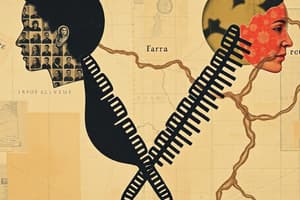Podcast
Questions and Answers
What defines a patriarchal society?
What defines a patriarchal society?
- A society that practices matrilineal inheritance.
- A social system where men primarily hold power over women and children. (correct)
- Women hold primary power in political and private spheres.
- A communal living structure absent of private property.
Which historical factor is associated with the rise of patriarchy, according to F. Engels?
Which historical factor is associated with the rise of patriarchy, according to F. Engels?
- The spread of religious beliefs.
- Demographic shifts in society.
- The invention of the wheel.
- The development of agriculture and private property. (correct)
How did the status of women in ancient Egypt compare to that in ancient Greece?
How did the status of women in ancient Egypt compare to that in ancient Greece?
- Greek women had more influence in trade than Egyptian women.
- Egyptian women had more legal rights and social status than Greek women. (correct)
- Greek women could inherit property, while Egyptian women could not.
- Women in both societies were equally restricted in their rights.
What does the term 'three obediences and four virtues' refer to in the context of Chinese society?
What does the term 'three obediences and four virtues' refer to in the context of Chinese society?
What significant event marks the first wave of women's empowerment?
What significant event marks the first wave of women's empowerment?
What chromosomes are typically associated with the female biological sex?
What chromosomes are typically associated with the female biological sex?
Which hormone is primarily associated with male biological characteristics?
Which hormone is primarily associated with male biological characteristics?
What term describes the phenomenon of determining the normality of behavior based on biological sex?
What term describes the phenomenon of determining the normality of behavior based on biological sex?
Which of the following best describes sexual orientation?
Which of the following best describes sexual orientation?
What is one of the components that differentiate gender identity from biological sex?
What is one of the components that differentiate gender identity from biological sex?
Study Notes
Biological Basis of Gender
- Chromosomes: Males have XY, females have XX.
- Gonads: Males possess testes, while females have ovaries.
- Hormones: Males predominantly produce testosterone; females primarily produce estrogen.
- Reproductive Structures: Males have Wolffian ducts; females develop Müllerian ducts.
- External Sex Structures: Males have a penis and scrotal sac; females have a clitoris and vagina.
Gender as a Social Construct
- Gender comprises the distinctive cultural traits associated with masculinity and femininity.
- Society defines gender roles through perception, roles, social expectations, and constructs of femininity and masculinity.
- Common stereotypes for males: logical, independent, leaders, sexually aggressive.
- Common stereotypes for females: emotional, dependent, followers, sexually submissive.
Heteronormativity and Gender Identity
- Heteronormativity: Establishes behaviors as normal, depending on alignment with biological sex.
- Gender Identity: Individual's sense of being a man, woman, or neither, which may not align with biological sex.
- Transgender: Individuals whose gender identity differs from their assigned sex at birth; may pursue gender reassignment surgery.
Sexual Orientation
- Heterosexuals: Attracted to the opposite sex.
- Homosexual: Attracted to the same sex (includes gay and lesbian).
- Bisexual: Attracted to both sexes.
Evolution of Gender and Sexuality Understanding
- Civilization Development: Women revered in early societies; societal structures shifted with agriculture and industrialization.
- Patriarchy: Social system where men dominate in power; characterized by property inheritance via males.
- Seen as a construct resulting from historical economic changes rather than a biological inevitability.
Historical Perspectives on Gender
- Greece: Women viewed as inferior, confined to domestic roles; access to education restricted.
- Egypt: Women had greater social status, including property rights, before Greek influence diminished these rights.
- China: Confucianism imposed strict roles on women, emphasizing obedience.
Modern Gender Inequality
- Sexism: Prejudice and discrimination based on sex.
- Gender Pay Gap: Persistent disparity in earnings between men and women.
- Underrepresentation: Women and minorities often lack presence in leadership roles.
Women's Empowerment Movements
- First Wave: Spanning from 1848 to 1920, focused on women's suffrage and voting rights.
Gender Norms and Socialization
- Social norms dictate behaviors; boys encouraged to show toughness, girls to be gentle.
- LGBTQ+ individuals often face bullying and discrimination for defying traditional gender roles.
Gender Studies Research Approaches
- Qualitative Methods: Focus on individual experiences through interviews and ethnography.
- Quantitative Methods: Use surveys and experiments to gather statistical data about populations.
- Mixed Methods: Combination of both qualitative and quantitative for comprehensive understanding.
Ethical Principles in Gender and Sexuality Research
- Informed Consent: Participants must understand and agree to research processes.
- Confidentiality: Protect participant identity and data.
- Non-maleficence and Beneficence: Research should cause no harm and provide societal benefits.
- Distributive Justice: Ensure studies do not disadvantage marginalized groups.
Psychosocial Perspective of Gender and Sexuality
- Reproductive Role: Social expectations surrounding child-rearing and household maintenance.
- Productive Role: Economic and public engagement roles assigned based on gender.
Sensory Influences on Sexual Behavior
- Olfactory Experience: Pheromones and Individual scent preferences influence partner attraction.
- Tactile Experience: Touch fosters intimacy, with primary and secondary erogenous zones identified.
- Auditory Experience: Verbal expressions of affection enhance intimacy during sexual interactions.
Definitions Related to Sexual Behavior
- Sexual Behavior: Actions with sexual intention.
- Erotic: Pertaining to sexual stimulation.
- Sexual Response Cycle: Sequence beginning with arousal, culminating in orgasm, followed by resolution.
Studying That Suits You
Use AI to generate personalized quizzes and flashcards to suit your learning preferences.
Related Documents
Description
This quiz explores the biological basis of gender classification, focusing on the differences between male and female attributes. Topics include chromosomes, gonads, hormones, and reproductive structures. Test your knowledge about how these determinants shape biological identity.




